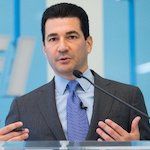Article
Scott Gottlieb, MD, Ends Tenure as FDA Commissioner
Author(s):
Reports state Gottlieb will be returning to familiar work once his temporary replacement, Ned Sharpless, MD, takes office on Monday.

Scott Gottlieb, MD
The tenure of US Food and Drug Administration (FDA) Commissioner Scott Gottlieb, MD, comes to a formal end today, just weeks prior to the two-year mark of his appointment by the Senate.
Last month, Gottlieb submitted his resignation as the 23rd commissioner of the FDA to Heath and Human Services Secretary Alex Azar, citing his weekly commute from his family’s home in Connecticut, and a desire to spend more time with his wife Allyson and 3 daughters.
In a public speaking event hosted by political publication The Hill the day after his announced resignation, Gottlieb elaborated on his decision. He reiterated the burden of his weekly commute, and implied the government shutdown earlier this year may have prolonged his stay with the administration.
Why leaving now?
.@SGottliebFDA: Occam's razor.
Notes commute from Connecticut. And says he planned to leave at some point. Wished he would have moved down to DC earlier, but didn't.
Says he had no plans to leave during the #shutdown #FDA #TheHillRxAccess #pharma
— Donna Young (@DonnaYoungDC) March 6, 2019
Though he also expressed interest in returning to the FDA after a hiatus during the same event, Gottlieb has already committed himself to part-time fellowship work with think-tank group American Enterprise Institute (AEI). According to a report by the New York Times, Gottlieb intends to spend a few days out of each month contributing input on drug pricing and health policy issues for his former place of work.
Gottlieb’s tenure with the FDA, however brief, was highlighted by efforts to streamline the FDA drug regulation-production process, improve the generic therapies market for costlier or less-resourced conditions, and bolster the development and marketing of novel therapies and devices.
Time and time again, he called for improved regulation of electronic cigarettes, challenging their limited safety profiles in the wake of an exploding market among adolescents and young adults in the US. That issue does not seem to have been resolved as Gottlieb leaves office—he told Vox this week that e-cigarette product companies such as Juul have driven what’s not a public health concern.
“This is now an addiction crisis, and it’s going to take time to reverse,” Gottlieb said. “I don’t anticipate we’re going to see a decline in youth use of e-cigarettes this year.”
THREAD: While we’re still learning about the long-term potential benefits and health risks of e-cigs, existing scientific research offers some clear evidence that several of the dangerous chemicals in tobacco smoke are also present in the aerosol of some e-cig products.
— Scott Gottlieb, M.D. (@SGottliebFDA) April 3, 2019
While Gottlieb returns to some familiarities next week, National Cancer Institute (NCI) Director Norman “Ned” Sharpless, MD, will be stepping into a new role as acting FDA commissioner.
Appointed by Azar 1 week following Gottlieb’s resignation, Sharpless has spent the past 2 years as the President Trump-appointed NCI director. He previously served as director of the University of North Carolina (UNC) Lineberger Comprehensive Cancer Center, and as an appointed member of the Association of American Cancer Institutes’ board of directors, as well as the National Institute of Aging’s National Advisory Council on Aging.
Sharpless will be tasked with overseeing the administration until a permanent commissioner is nominated by President Trump, and confirmed by a Senate majority vote. At the time of Sharpless’ appointment, Azar had confirmed that a search for a permanent replacement was underway.



